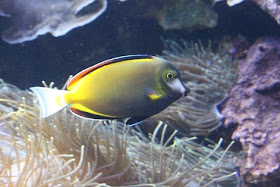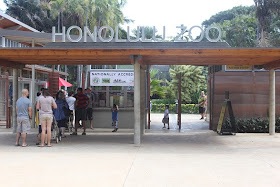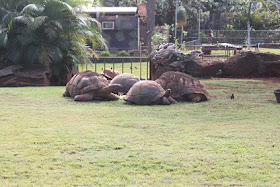I visited WAIKIKI AQUARIUM. It is my second time to visit WAIKIKI AQUARIUM. I have wanted to see marine creatures of overseas. At the aquarium, I was surprised that I could see not only rare tropical fish but also many kinds of corals. It’s my first time to see Gold Lobster and marine comet. They have amazing color and shape. Furthermore the aquarium has a coral farm and a giant clams farm which cultivate those creatures. I think we cannot see them at any other aquarium.
Posted by Yoshitaka Kiriake from Japan on December 29, 2012.
福島第一原発事故による影響を見るため各地を訪問している。ワイキキ水族館では2500匹以上の熱帯海洋生物を観察することが出来る。彼らは我々と同じ環境で暮らしており、彼らの健康状態を見ることは重要である。
Gold Lobster
Lack of pigments makes the color.
WAIKIKI BEACH
Entrance of WAIKIKI AQUARIUM
Have you ever seen a marine comet?
I could enjoy seeing tropical fish and real corals.
How beautiful!
Corals are alive!
Corals are alive!
How big giant clams are!
There are more than 2,500 marine creatures that live in Hawaii and the tropical Pacific.
Frogfish
This Hawaiian monk seal is 4 years old.
He is 12 years old.
He eats 8 to 10 pounds of fish every day.
He eats 8 to 10 pounds of fish every day.
The aquarium has a coral farm and a giant clams farm.
How lucky I am!
I could see a rainbow on the beach!
I have visited some Japanese zoo and aquarium to see the effects of Fukushima Daiichi nuclear power plant accident.
I find no effect by the accident in Tokyo at the moment. There is a concern that radioactive materials will flow to overseas by the ocean current. So I visited WAIKIKI AQUARIUM to see marine creatures.
I hope that radioactive materials from the site couldn’t reach here and the accident couldn’t affect Hawaiian creatures.
Deformed lip
However I found one fish which had a deformed lip at the aquarium. I don’t know what caused it. I think that the nuclear accident has no relation with it. Because it is too far to affect it. It seems that it was caused by injury or some congenital disease.
Public Health
Network in Japan





























































